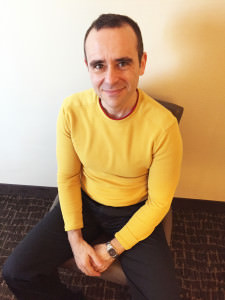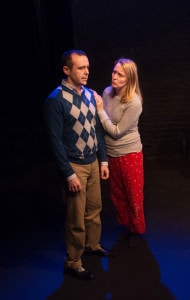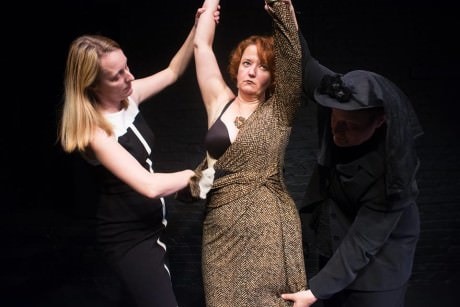In Part 1 of a series of interviews with the cast of George is Dead at The Klunch, meet John Tweel.
Joel: Please tell our readers where they may have seen you perform on our local stages?

John: I’ve done shows at several area theaters, including American Century Theater, Spooky Action Theater, WSC Avant Bard, Olney Theatre Center; as well as a couple that aren’t around anymore, such as Solas Nua and Catalyst Theater Company. Oh, and Cherry Red Productions of course.
What is it about George is Dead that made you want to be part of the cast?
It’s always exciting to be in the first production of a new theater. And it’s even more enticing if it’s someone you know and trust that’s invited you to be a part of this organization from the ground up. Ian called me this past summer wondering if I’d like to be a part of this show written by Elaine May and I immediately said, “Yes.”
Who do you play in the show and how do you relate to your character? What do you like the most about your character?
My character, Michael, is married to Fiona Blackshaw’s character Carla. Michael may initially come across as selfish and abrasive but he also makes some observations about his life and his relationship that are pretty astute. I like the fact that Michael is willing to take a risk with his relationship with Carla in order to “shake things up” and hopefully make other people look at the reality of their situations.
What is the show about from Michael’s point of view?
I see Michael as a catalyst for Carla’s journey in that he is able to bring an objective eye to what she’s allowing herself to be exposed to. He doesn’t approve of Doreen and he doesn’t approve of Carla’s relationship with Doreen, especially when he sees what’s become of Carla when he notices what she’s allowed Doreen to do over the course of the play. He thinks it’s time for some changes in their relationship and maybe these will be the changes needed so he can continue with her.
Have you ever heard of Elaine May before working on this show and had you seen any of her work before? And now that you are working on her play, what impresses you most about her writing?
I’ve known about Elaine May for many years. I had always known about her partnership with Mike Nichols and their improv comedy. I distinctly remember seeing an episode of American Masters on PBS several years ago that chronicled their career through the late 50s and 60s. They showed one of their appearances on an old Emmy Awards broadcast where May was “presenting” an award for Total Mediocrity and Nichols played the “winner” coming out from the audience. Screamingly funny. You may even be able to see it on YouTube. Also, Ian provided the cast with links to a couple of Elaine May films, including her appearance in Woody Allen’s Small Time Crooks and a cute little gem she directed called The Heartbreak Kid– the original one, not the Ben Stiller monstrosity. And I was also able to see a copy of her performance in A New Leaf with Walter Matthau.

What is your favorite line or lines in the show and what is your favorite line or lines that someone else recites, and why?
The genius of May’s writing is that it takes an unflinching look at all the discomforts of life. It is pure situational comedy, the kind where you have a shiver of recognition at the same time you’re laughing. May’s sense of comedy comes from exposing human weaknesses and frailties and hopefully giving the audience permission to laugh at how absurd life can be. Many of her characters are not nice people, but they don’t know they’re not being nice. At times they even think they’re actually helping the other person but don’t realize how caustic and abusive they are being.
There’s a wonderful scene in Heartbreak Kid where Charles Grodin is in a restaurant with his wife played by May’s daughter Jeannie Berlin. I was laughing at the same time I was squirming all over my couch because the situation was so uncomfortable but at the same time so honest. Berlin was deservedly nominated for an Academy Award for her performance.
What is the best advice or the most helpful suggestions that Director Ian Allen has given you that has made your performance better.
Before rehearsals started, Ian sent the cast this wonderful essay titled “How to Speak Poetry” by Leonard Cohen that basically outlines his idea for the tone of his productions and the way he likes to work. The main thrust of the piece is to get the actors “out of their own way” and merely convey the data without any extraneous emotion or declamation. There’s no need for “Acting” with a capital “A.” Just speak the words. “Convey the data, step aside” is one of Ian’s favorite catchphrases. And it’s a philosophy I wholeheartedly agree with. Sometimes it’s not what you do that’s the most telling, it’s what you DON’T do that captures the audience’s attention. And especially with a piece like this it’s very appropriate.
The thing I like most about Ian is that he’s fearless. He will not compromise the quality of the productions and he does not care about offending anyone. He expects everyone to come into a production with the most professional attitude and he also leads by example. He’s also one of the most intelligent and perceptive directors I’ve worked with. No detail is too small for him to address if it means adding to the quality of the show.
What is your favorite line or lines in the show and what is your favorite line or lines that someone else recites and why?
Michael has a line where he says that, “America has now become a reality show and no one will change the channel.” I think that’s especially prescient, given the state of American politics these days.
Some of the lines that Doreen says just astound me. How can a woman who just lost her husband be concerned about throw pillows? I point these out to Ian and we’re just amazed that someone can be so narcissistic and clueless.

What has been the most fun for you in rehearsals? What is the craziest thing that has happened in rehearsals?
The most fun I’ve had in rehearsals is seeing all this talent come together to build this neat little one-act. It’s been an absolute pleasure seeing Fiona and Kerri build this rapport both on and off stage. I had worked with Fiona before and I had seen Kerri onstage but this was my first time working with her. She gives her all in this production and it’s great to work off of. The tech crew is also one of the most professional and dedicated I’ve worked with. The set, the costumes, the lighting, everything has come together in a relatively short amount of time and been done expertly.
As far as the craziest thing? Nothing has happened that I would really call crazy. We had to rehearse in a hotel room for the first couple of weekends but that’s not really crazy. We also rehearsed mostly on weekends because Ian has to commute down from New York City, but I wouldn’t call that crazy, just the reality of the situation.
You are veteran of Ian Allen’s Cherry Red Productions. What shows did you appear in there and who did you play?
I first worked at Cherry Red in Anton Dudley’s Spamlet as the dim-witted Hercules. Ian performed in that production. And I then appeared as Dan Rather in Kenneth, What is the Frequency? the following season. Ian and Monique LaForce co-wrote and co-directed that one.
What is it about Ian Allen that attracted you to join his new theatre company The Klunch?

The thing I like most about Ian is that he’s fearless. He will not compromise the quality of the productions and he does not care about offending anyone. He expects everyone to come into a production with the most professional attitude and he also leads by example. He’s also one of the most intelligent and perceptive directors I’ve worked with. No detail is too small for him to address if it means adding to the quality of the show.
And what do you hope The Klunch will offer local theatregoers that will entice them to come to see this new theater company’s productions?
Hopefully, audiences will notice this and give The Klunch the recognition it deserves. The Klunch will get audiences involved in small productions that also may have a big impact on their lives.
What do you want audiences to take with them after seeing you perform in George is Dead?
George is Dead will affect different people in different ways. The comedy definitely comes from a dark place, but we’d like to get audiences comfortable enough to laugh in spite of these uncomfortable situations they’re witnessing. There will be giggles from some, guffaws from others. But even if they don’t laugh out loud, I hope audiences will at least see the show and say, “That was really well made.” Or at least, “That didn’t suck.” ;-)
George is Dead plays through December 19, 2015 at The Klunch performing at The DC Arts Center (DCAC) – 2438 18th Street, NW, in Washington, DC. For tickets, buy them at the box office 30 minutes before the performance, or purchase them online.





